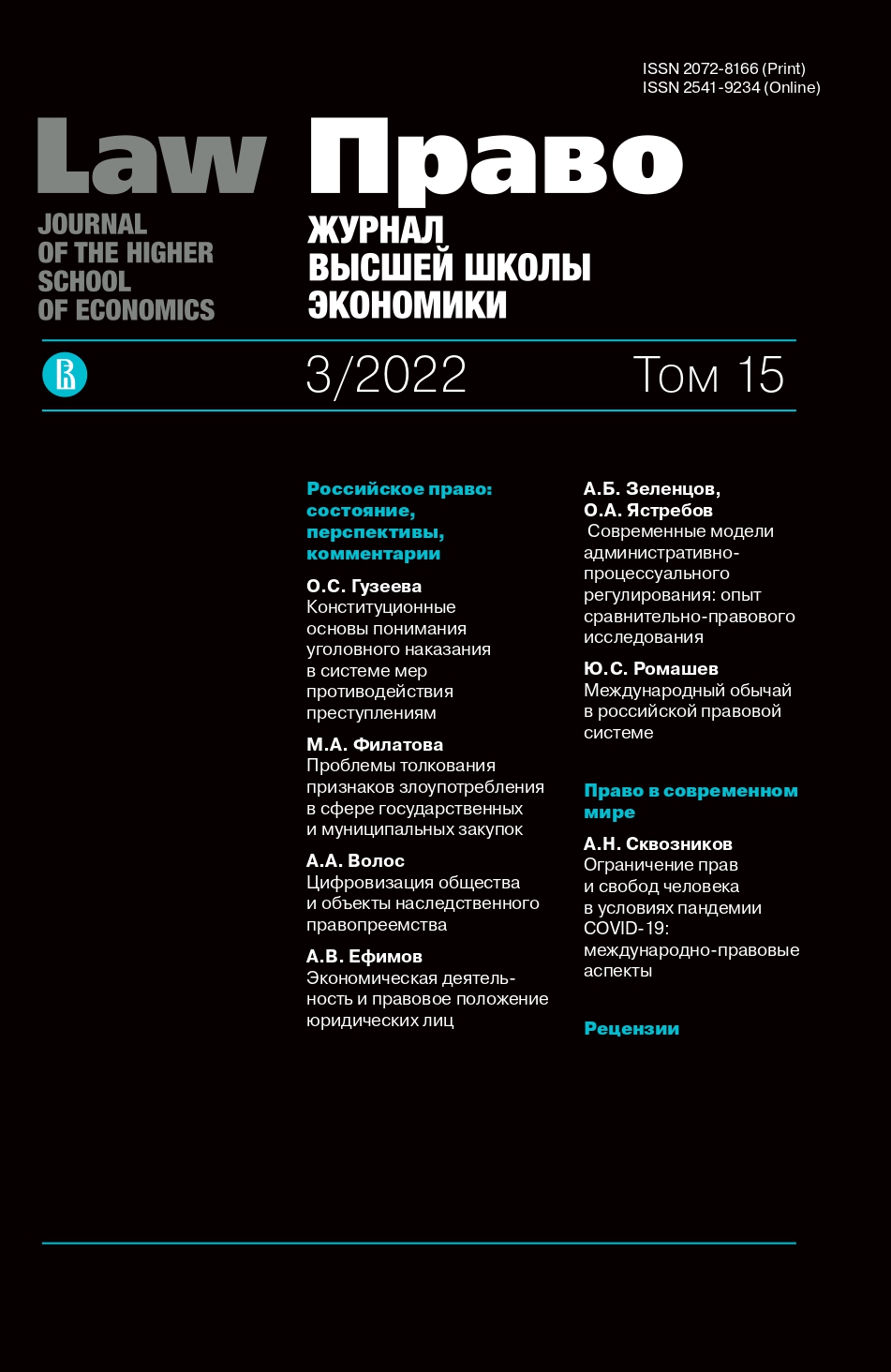Конституционные основы понимания уголовного наказания в системе мер противодействия преступлениям
Аннотация
Ограничение прав и свобод человека в целях предупреждения совершения преступлений является одним из важных и сложных направлений правовой политики государства. Здесь пересекаются, с одной стороны, конституционно значимые требования относительно оснований ограничения прав человека, с другой — криминологические постулаты о желательности раннего предупреждения преступлений на предкриминальной стадии, конституционные представления о жестких пределах ограничения прав человека и криминологические свидетельства необходимости контроля за поведением лица на посткриминальной стадии, стандарты ограничения прав лица, совершившего преступление, только рамками уголовного права и потребность в возложении на него иных правовых санкций за пределами уголовного права. Эти противоречия создают целостный комплекс проблем правового регулирования, включающий рассуждения о видах, целях, основаниях правоограничений и их конституционной допустимости. На основе анализа решений Конституционного Суда Российской Федерации и нормативных правовых актов в статье даны рассуждения о системе правоограничительных мер противодействия преступлениям. В такую систему включены меры, применяемые на предкриминальной стадии, меры процессуального обеспечения, меры уголовного наказания, меры уголовно-правового характера, меры, применяемые на посткриминальной стадии, неуголовно-правовые последствия совершения преступлений. Применительно к каждой группе мер определены правовые позиции Конституционного Суда, соблюдение которых позволяет, с одной стороны, согласовать эти меры в едином комплексе правоограничений, с другой, предельно четко их противопоставить друг другу с целью избежать нарушения отраслевой правовой природы и нарушения принципа справедливости. Особенное внимание уделено специфическим признакам уголовного наказания в общем ряду правоограничений. Доказано, что таковые связаны с основанием, сущностью и целью наказания. Отличительной сущностной характеристикой наказания признается наличие в нем выраженного морального упрека со стороны общества в адрес преступника. Только наказание, назначенное именно за совершение преступления, выражает такой согласованный упрек и в силу этого ориентировано на исправление преступника.
Литература
Antipov S.A. (2012) Constitutional basic of general part of criminal law. Moscow: Prospekt, 144 p. (in Russ.)
Babaev M.M., Pudovochkin Yu. E. (2021) Essays in criminal risks. Moscow: Yurlitinform, 368 p. (in Russ.)
Duyunov V.K. (1997) Punishment in Russian criminal law: constraint or penalty? Gosudarstvo ipravo=State and Law, no. 11, pp. 61-68 (in Russ.)
Dvoryanskov I.V. (2005) Efficiency of alternate punishment (compensation model'). Moscow: Yuniti-Dana, 96 p. (in Russ.)
Dzhalgasynova G.D. (2012) Triple aiyp as a criminal penalty. Bishkek: University Press, 74 p. (in Russ.)
Fatkhudinov A.I. (2003) Aims of punishment and regulating mechanism of its destination. Candidate of Juridical Sciences Thesis. Kazan', 185 p. (in Russ.)
Gurin D.V. (2015) The right of a state for criminal punishment and division of powers. Biblioteka kriminalista=Library of Criminalist, no. 2, pp. 57-72 (in Russ.)
Gurin D.V. (2014) The right of state for criminal punishment: content and forms. Biblioteka kriminalista=Library of Criminalist, no. 6, pp. 32-52 (in Russ.)
Gurinskaya A.L. (2018) Anglo-American model of preventing crimes: critical analysis. Saint Petersburg: RGPU Press, 400 p. (in Russ.)
Kurganov S.I. (2008) Penalty: legal and criminogical aspects. Moscow: Prospekt, 191 p. (in Russ.)
Mal'tsev V.V. (2007) Punishment and its setting in criminal law. Volgograd: MVD Rossii, 224 p. (in Russ.)
Popadenko E.V., Silkin V.P. (2019) From punishment approach to rehabilitation. Vestnik Nizhegorodskoi akademii MVD Rossii=Herald of Nizhny Novgorod Academy of Interior, no. 4, pp. 205-210 (in Russ.) DOI: https://doi.org/10.36511/2078-5356-2019-4-205-210
Tagantsev N.S. (1902) Russian criminal law. Lectures. Saint Petersburg: University, 823 p. (in Russ.)
Zhalinskyi A.E. et al. (2011) Criminal law. Moscow: Gorodets, 863 p. (in Russ.)
Zvecharovskii I.E. (1999) Criminal law measures. Zakonnost'=Legality, no. 3, pp. 36-39 (in Russ.)
Copyright (c) 2022 Право. Журнал Высшей школы экономики

Это произведение доступно по лицензии Creative Commons «Attribution-ShareAlike» («Атрибуция — На тех же условиях») 4.0 Всемирная.


















